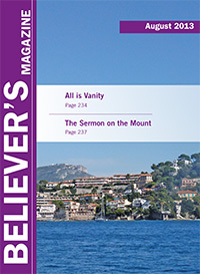The book of the Psalms opens in a remarkable way. The reader pauses as the eye focuses on the word "Blessed". The first psalm commences with this expression, as do two other psalms (32 and 41), and causes one to stop, to consider, to wonder. That single word is one of promise which cannot be overlooked. It can be spoken of accurately in the plural, "all blessedness". The world today cries out for happiness. Only by following the instruction of vv.1-3 can this be found.
Yet, initially, the reader must accept that the opening three verses speak of the one Man who was able to live fully in accord with the words of Scripture. It tells us of a perfect man who is presented to us as "an estimate of perfect human character, when tried in the furnace of an evil world, and determinately ascertained in the pure light of the Divine presence".¹
But the psalm also has lessons for those who seek to follow this Man. In society today believers are constantly seeing and hearing that which is designed to overthrow the Word of God. It has been suggested, however, that the opening word, "Blessed", is "hung out like a sign to attract the reader to what is inside".² For the believer it is wise to be attracted by that "sign" and not by that which the world holds up in display.
The opening describes the world of the ungodly, in which there is a progression in their behaviour. The believer is warned not to walk in the counsel of the ungodly, nor stand in the way of sinners, nor sit in the seat of the scornful. There is a progression here: walking, standing, sitting. To sit with them is to be at ease in association with them, in deliberate confederacy together.
The enemy of our souls seeks to make the world attractive and appealing. The means of filling our hearts, minds and lives is constantly around us. Care has to be exercised in what we see, in how time is spent, and in the company we keep.
But for those who heed the warning of v.1 the godly behaviour of vv.2-3 is open to them. Their "delight is in the law of the Lord". In Scripture they find their pleasure and joy; they will feel great favour towards the Word of the Lord. Not only so, their reading of the Scriptures is linked with their meditation. The Word of God must be read, but there must also be consideration and contemplation. In that way it will become their intelligent companion to be followed and obeyed. Before Joshua was given the responsibility of leading Israel into Canaan he was instructed, "This book of the law shall not depart out of thy mouth; but thou shalt meditate therein day and night, that thou mayest observe to do according to all that is written therein" (Josh 1.8). Good advice for all! "All scripture is given by inspiration of God, and is profitable…" (2 Tim 3.16).
And what will be the result of reading and heeding the Word of God? Plainly it is written, "And he shall be like a tree, planted by the rivers of water" (v.3). Those who delight in and meditate upon the Word of God will be like a planted tree, one placed in a specific planned place which makes it fruitful. Note that the planting is by the "rivers" (brooks, JND; rivulets, YLT) where there will be no shortage of water, a condition that brings growth and freshness where the soul will never be parched, nor will it ever be starved.
There is much around today to occupy our time. Technology can be useful or wasteful. Ensure that the Scriptures are not set aside or used simply as a book from which a few moments are snatched occasionally. By that way the "delight" that Scripture brings will be lost, the spiritual intelligence that it brings will not be gained. Let us live so that we know by experience the blessing of which the Psalmist writes, and learn what it is to be fruitful.
¹ A Pridham: Notes and Reflections on the Psalms.
² Baker Commentary on the Old Testament Wisdom and Psalms.









